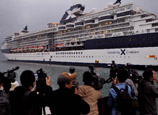
Wen: Of course. What’s your advice for Chinese people to deal with those challenges?
Brzezinski: I think that Premier Wen, in his so-to-speak final speech, spoke rather well about some of these difficulties. And as I said earlier, they are derived from success. Success has created a large scale middle class, an urban middle class. It has created a whole new young generation of Chinese who are in touch with the world by computers. In addition, China has created circumstances in which truly millions travel abroad and hundreds of thousands study abroad. In that context, excessive reliance on authority, censorship, privileged relationships which produce corruption, and secrecy about circumstances in which officials take advantage of their positions to gain special benefits and particularly wealth, are all things which are damaging to China’s prospects and could produce social tensions and impatience.
All of that I know China’s leaders understand and think about. It’s very easy for me to talk about it sitting here in Washington. It’s much more difficult to deal with when living in or governing a country with 1.3 billon people, so I understand the difficulties the Chinese leaders face. But I think confronting these problems openly and discussing them openly is the best way to resolve them in a manner that will be satisfactory to China, in a manner that is the Chinese way of solving these problems. Doing so will eliminate some of the tendency toward sterility, self-centeredness, and abuse of privilege, not to mention some forms of censorship which prevent a constructive, nationwide social debate about domestic problems. The Chinese people are extraordinary sophisticated, and the new Chinese middle class is extraordinarily well-informed about the outside world. Hence an open debate about some of these issues would strengthen the government, would strengthen the country and would make it more effective in dealing with problems which could become like an illness, a gradual appearance of internal difficulties which then become more pervasive and more destructive.
Wen: Well, another topic is that many people are now talking about whether conflict between America and China is inevitable. You were talking about the post-hegemonic age and said that in fact, that the relationship itself is good. Can you elaborate this? Do you think we can break the so-called historical premise that an emerging country and an established power will eventually head toward confrontation?
Brzezinski: Well, I have been involved in debates on this with some experts who argue that all the lessons of history and political science say there has to be conflict. I have also been discussing this with some of my friends in the US government. And I have stated my view publicly that a stable cooperative partnership between American and China is in the interests of both countries. But it is a relationship, which if it is a partnership, is one that requires nourishing cooperation, promoting it, sustaining it, and not thoughtlessly damaging it. There are tendencies to damage it both in China and in the United States, and I think we should be prepared to confront those tendencies openly.
Wen: well, a lot people talk about the G2, and something now is referred to as C2.
Brzezinski: What is C2?
Wen: Well, C2 is consulting two.
Brzezinski: Oh, I see consulting, yes.?
Wen: How do you define the relationship?
Brzezinski: Well, I am a little worried about the relationship right now. Because as you know there have been a lot of criticisms of China in the United States. Even a former presidential candidate, said publicly that he would—
Wen: Yes, Mr. Romney.?
Brzezinski: —Yes, he said he would verbally attack China on the day of his inaugural. But this is something that I really want to point out to you and to the readers of our interview: there is a significant difference between the American attitude and what I see in China. On the American side, we have a population that is not actively debating foreign policy, but we have a population that can express itself very freely on every subject. We have a press that is totally free. Our press continuously criticizes our president, our government, our policies, and it is quite customary for our politicians to denounce our own leaders. So we know that what is stated in that context by the American side, particular about China, has to be seen as what is official and what is just public discourse. And a lot of public discourse about China is not serious. It is just frustration or envy or ignorance or whatever. Our public statements, our official statements, are prudent and careful. The president never used the word “pivot". when he talked about the recent change in the degree of attention we pay to the Atlantic and to the Pacific regions, and to the argument, which I think is historically correct, that since Asia is becoming more important, we have to be more involved in the Pacific region. On the Chinese side, you have a press which never criticizes the government. There are no newspaper articles about corrupt senior officials until the government criticizes those officials. There are no critical statements about the Chinese leaders. So what your press says about us is more official. And it is much more nationalistic. As a result, what worries me these days is what I see in the Chinese press.
These are semi-official statements. So your press is an official speaker and you are creating an atmosphere—and this is for serious now—you are creating an atmosphere in China in which you are stirring up a very powerful social force, which is nationalism. You can create, especially in the context of domestic difficulties, an atmosphere dominated by nationalism, which will make it impossible for you to cooperate with us. And it will make it impossible for us to cooperate with you. We don’t have that in this country. No one I know in the government talks badly about China. Among private people, yes, a lot of them talk about China badly—some businessmen, for example, who cannot compete with you. But others in America say “oh, no, protect our access to China, have the Chinese come here.” We have a diversity of views. Your nationalism is also strong because at this stage of your history, you are acquiring a sense of success after a century and a half of bitter wars and domestic humiliation. So your nationalism tends to be dangerously strong, and if you’re not careful, you will not only make your relationship with Japan more difficult—and we are telling the Japanese all the time not to make the relationship with China more difficult—I’ve done it personally—but you’re making it more difficult not only to deal yourselves with the Japanese, but with us.
So I am concerned about the rise of nationalism in China, and your military are the most nationalistic. And don’t make the mistake that other countries have made a century ago. You are not going to be a global hegemony; we are not going to be a global hegemony, because the world is too complicated. But by working together, we can be partners in gradually overcoming the pressures toward turmoil and chaos which are becoming stronger everywhere in the world. And this is where historical and strategic responsibility creates a unique opportunity for America and China. And I think your leaders should think about what is being fomented, because statements like these are not going to influence President Xi—he is too intelligent for that—but they will influence a lot of people.


















 Beijing's 2013 pollution goals set far too low: experts
Beijing's 2013 pollution goals set far too low: experts


![]()
